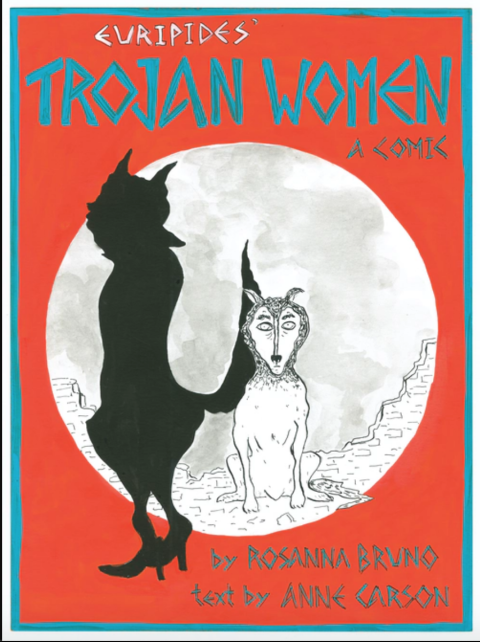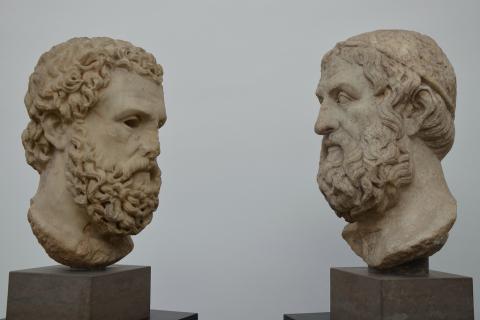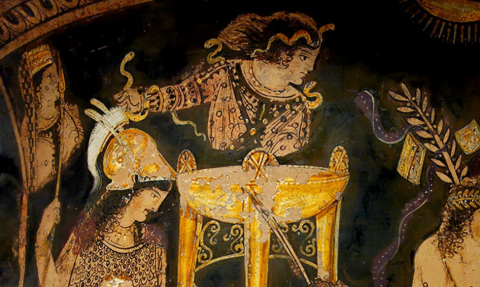SCS Blog Author Page
Posts by Christopher Trinacty

|
Blog: “Can We Strangle the Muse?”: Carson and Bruno’s The Trojan Women
By Christopher Trinacty, Emma Glen, and Emily Hudson (Oberlin College) Anne Carson’s celebrated adaptations and translations of Ancient Greek and Latin literature have ranged from imagining the love affair between Geryon and Heracles in The Autobiography of Red to meditating about the death of her brother through Catullus 101 in Nox. In our opinion, Carson’s works highlight her theoretical sophistication as well as her deep commitment to the reception of Classics broadly understood. This new “comic” version of Euripides’ Trojan Women by Carson and illustrator Rosanna Bruno offers a creative and challenging take on Euripides’s tragedy. Carson’s literary career has Read more … |

|
Blog: The Art of Translation: An Interview with Poet Aaron Poochigian
Aaron Poochigian is a poet and translator based in New York City. After receiving his PhD in Classics from the University of Minnesota in 2006 (with a dissertation on “The Staging of Aeschylus’ Persians, Seven Against Thebes, and Suppliants”), Aaron pursued a career translating Ancient Greek poetry and composing his own. His poetry has been featured in Best American Poetry 2018 (eds. Lehman and Gioia), Poetry, and Poems Out Loud. His collection, Manhattanite, won the Able Muse Book Award for Poetry (2017) and features such wonderful verses as these, about a blizzard: Doomed, though, like ice is doomed, this wicked bright Seagull Behemoth soon must furl his gusts and die the same slow way the drifts accrued, Read more … |

|
Blog: Predicting the Future of Classics
Perhaps paradoxically, Classicists spend a lot of time thinking about the future of our field. Although we spend the majority of our working days researching ancient material, teaching such material to students, and thinking about the particulars of a Latin text, North African relief, Hellenistic religious rite, or exceptionally obscure Greek gnome (e.g. “Water is best”), we often wonder (with various levels of anxiety) how such work will be done in the future, or if there will even be Classics in the future. This worry is not new. One can find Thomas Jefferson in 1782 lamenting that the study of Greek and Latin was on the decline in Europe, or even Thomas More two centuries earlier writing of a club in Oxford that was threatening to ban classical learning because of the religious quandaries arising from the study of Greek. From Hanson and Heath’s Who Killed Homer?: The Demise of Classical Education and Read more … |

|
Blog: Graphic Mythology: How Graphic Novels Visualize the Ancient World
What is the role of graphic novels in teaching the ancient world to students? Prof. Chris Trinacty addresses this question and reviews two recent additions to the genre: Rome West and The Hero (Book Two). Two recent graphic novels touch upon the ancient world in fascinating ways. The first, Rome West, by Justin Giampaoli, Brian Wood, and Andrea Mutti provides an alternative history of the world predicated on the idea that a lost legion of Roman soldiers make landfall in North America in the year 323 CE. The second, The Hero, published by Dark Horse Comics in two volumes is a creative take on Heracles’ Twelve Labors that offers a mash-up of modern celebrity culture, Read more … |

|
Blog: Music and Mythology: A Classics Playlist for the End of Summer
Classical reception is evident in pop-culture media like films and TV, but it is also a recognizable part of music. I began to ponder this recently after hearing BBC Radio 6 ask the question “What song should be on a playlist inspired by ancient history and why?” The following post details some songs that I’ve enjoyed over the years that feature references to ancient history and the ancient world more generally. First, a few caveats. I’m leaving out obvious works like Purcell’s “Dido and Aeneas”, Iron Maiden’s “Flight of Icarus”, or my son’s favorite “Troy Song.” Some are as fleeting as a title, others are more intrinsic to the song itself whether as subject-matter, imagery, or refrain. While I’ve had some success utilizing these songs in teaching (e.g. the video for “ Read more … |
|
|
Blog: Teaching and Learning at the Museum, A Liberal Arts College Perspective
Campus museums can help professors not only to teach about the ancient world, but also to explore connections between different civilizations, time periods, and media. At Oberlin College, professors engage with the collection at the Allen Memorial Art Museum to teach a variety of topics – from philosophy to cinema studies, from anthropology to book studies. This collaboration between professors and the museum’s curators creates evocative and unexpected links for both students and professors, aiding in the interdisciplinary exploration of material. At Oberlin, it is common for professors to use the museum at some point in the semester– over 300 classes from 32 different disciplines come to the museum each academic year. Read more … |
